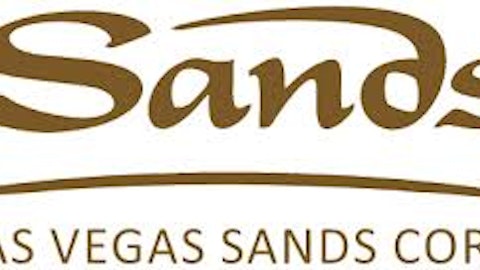Las Vegas Sands Corp. (NYSE:LVS) is one of the world’s leading global developers of destination properties with a focus on gaming, entertainment, convention and exhibition facilities. With properties spread out across the United States and Asia, Las Vegas Sands Corp. (NYSE:LVS) holds significant advantages that their competitors only dream of.

In gambling lingo a ‘whale’ is an individual that will gamble a minimum of $150,000 per hand. Casino operators in Macau have reported a pick-up in the number of Chinese whales since the conclusion of the Chinese New Year in February, giving clear indications that casino operators like Las Vegas Sands Corp. (NYSE:LVS) will have a great year in Macau, the world’s biggest gambling market.
Being one of the first firms to open a casino in Macau, and expanding to four properties recently, has helped Las Vegas Sands Corp. (NYSE:LVS)dominate the region. Wynn Resorts, Limited (NASDAQ:WYNN), one of its closest competitors, only reported a “modest” gain of 4.4% during their quarterly reports, while Las Vegas Sands Corp. (NYSE:LVS) reported a 14.8% increase in net income. Meanwhile, Caesars Entertainment Corp (NASDAQ:CZR) seemed to have missed the boat on the Macau growth story (they have no properties in the region), and thus reported quarterly losses of $1.74 a share, worse than the consensus estimate of $1.58 loss per share.
No drama at Las Vegas Sands
The company is considering a large bond offering to facilitate a return of capital to shareholders, based on comments that were made during the company’s conference call. Billionaire CEO Sheldon Adelson was quoted as saying “”We will also consider, seriously consider, other avenues to return capital to shareholders in the future including special dividends and the implementation of a stock repurchase program.” Keep in mind, Las Vegas Sands Corp. (NYSE:LVS) offered a special $2.75 dividend at the end of 2012, in addition to upping their regular quarterly dividends by a quarter per share.
Meanwhile, Steve Wynn, the largest shareholder and CEO of Wynn Resorts, Limited (NASDAQ:WYNN), is likely facing a legal battle over his ex wife’s shares, which he controls. If his ex wife prevails in a court fight to force Mr Wynn to sell her 9.6% stake, it can trigger events that can threaten not only his personal fortune, but the entire company.
MGM Resorts International (NYSE:MGM): The forgotten, smaller player
Las Vegas Sands has a market cap of $47 billion, while MGM Resorts International (NYSE:MGM) stands at barely $7 billion. Despite the difference, MGM Grand has invested heavily in the Macau growth story with a 35 story, 600 room casino resort that makes the casino the 6th largest in the world. MGM is planning to invest another $2.5 billion in Macau in an attempt to take away market share from the bigger players.
MGM Resorts is also committed to returning capital to shareholders, and said MGM China has put in place a regular dividend distribution policy for up to 35% of its annual profits to be paid semi-annually. MGM China’s board will also consider putting forward special dividends from time to time, the parent company said. MGM China paid a $500 million dividend in March, of which $255 million was retained by the parent company.
Closing remarks
Las Vegas Sands is clearly the best investment choice based on their leg up over competitors, strong commitment to returning value to shareholders, and, most importantly, the vision of Mr Adelson to be one of the first in Macau, Singapore, and now the Cotai Strip. Competitors will be playing catch up for years, and investors should always invest in the leader, not the followers.
The article Investing in Las Vegas Sands Is No Gamble originally appeared on Fool.com and is written by Jayson Derrick.
Copyright © 1995 – 2013 The Motley Fool, LLC. All rights reserved. The Motley Fool has a disclosure policy.


